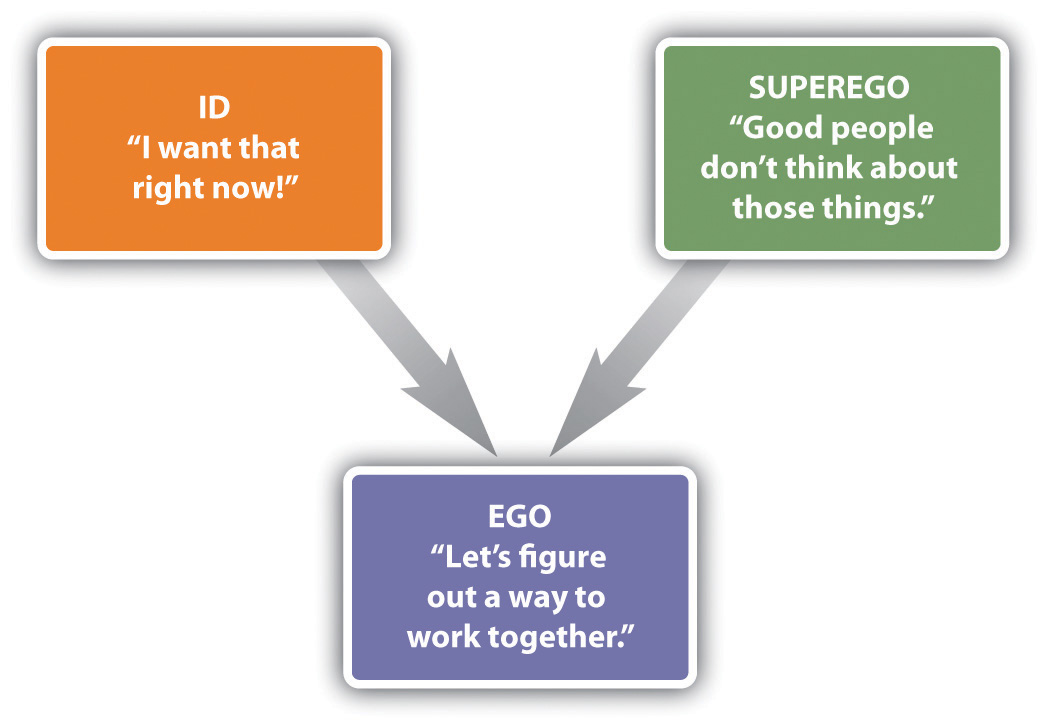Day 23 - Personality - Reflection
Learning Targets - Students will be able to
- Analyze the trait approach and how it identifies a person’s most striking personality characteristics
Opener - Where does my personality come from?
Psychodynamic approach, an approach to understanding human behavior that focuses on the role of unconscious thoughts, feelings, and memories.
The id is the component of personality that forms the basis of our most primitive impulses.
The superego represents our sense of morality and ethics.
The ego is the largely conscious controller or decision-maker of personality.

Defense mechanisms — unconscious psychological strategies used to cope with anxiety and maintain a positive self-image. Freud believed that the defence mechanisms were essential for effective coping with everyday life, but that any of them could be overused
Activity #2 - "Do drugs feed the id or ease the anxiety?"
- Although measures such as the Big Five and the Minnesota Multiphasic Personality Inventory (MMPI) are able to effectively assess personality, they do not say much about where personality comes from.
- What do you think?
Psychodynamic approach, an approach to understanding human behavior that focuses on the role of unconscious thoughts, feelings, and memories.
- Freud proposed that the mind is divided into three components: id, ego, and superego, and that the interactions and conflicts among the components create personality
The id is the component of personality that forms the basis of our most primitive impulses.
- The id is entirely unconscious, and it drives our most important motivations, including the sexual drive (libido) and the aggressive or destructive drive
- According to Freud, the id is driven by the pleasure principle — the desire for immediate gratification of our base instinct urges.
- The id is why we smoke cigarettes, drink alcohol,, tell mean jokes about people, and engage in other fun or harmful behaviors, often at the cost of doing more productive activities.
The superego represents our sense of morality and ethics.
- The superego tell us all the things that we shouldn’t do, or the duties and obligations of society. The superego strives for perfection, and when we fail to live up to its demands we feel guilty.
The ego is the largely conscious controller or decision-maker of personality.
- The ego serves as the intermediary between the desires of the id and the constraints of society contained in the superego.
- The ego is based on the reality principle — the idea that we must delay gratification of our basic motivations until the appropriate time with the appropriate outlet.

Defense mechanisms — unconscious psychological strategies used to cope with anxiety and maintain a positive self-image. Freud believed that the defence mechanisms were essential for effective coping with everyday life, but that any of them could be overused
Activity #2 - "Do drugs feed the id or ease the anxiety?"
Carefully read the article linked below regarding addiction and psychodynamic theory. Once you have finished, answer the following questions on a separate sheet of paper to turn in before you leave.
1. How does the author explain addiction through psychodynamic theory? Do you agree? Why or why not?
2. What questions would you ask the author about his article if he were here?
3. Based on the article, to what extent do some people's personalities leave them more likely to use drugs?
https://www.psychologytoday.com/us/blog/science-choice/201410/psychodynamic-way-understanding-addiction
1. How does the author explain addiction through psychodynamic theory? Do you agree? Why or why not?
2. What questions would you ask the author about his article if he were here?
3. Based on the article, to what extent do some people's personalities leave them more likely to use drugs?
https://www.psychologytoday.com/us/blog/science-choice/201410/psychodynamic-way-understanding-addiction
Close - Post at least 2 questions here:
https://docs.google.com/spreadsheets/d/1iKDtCmP_Q4AHlAjd2APb2qjx2U2xTSgqM71Hmvl9KK4/edit?usp=sharing
MAKE SURE THAT YOU CLICK THE APPROPRIATE TAB AT THE BOTTOM OF THE PAGE
https://docs.google.com/spreadsheets/d/1iKDtCmP_Q4AHlAjd2APb2qjx2U2xTSgqM71Hmvl9KK4/edit?usp=sharing
MAKE SURE THAT YOU CLICK THE APPROPRIATE TAB AT THE BOTTOM OF THE PAGE

No comments:
Post a Comment